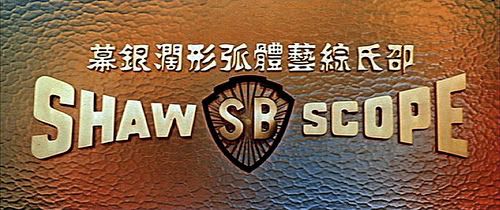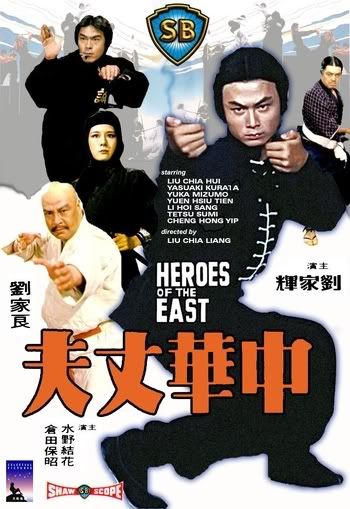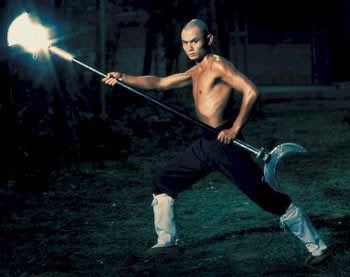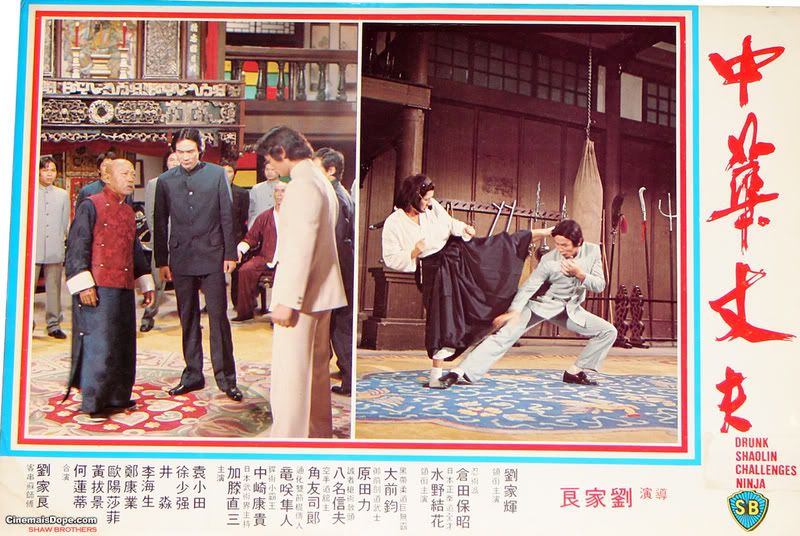
The Discordant Lover
---------------------
It's a continual source of wonder for me: how certain pieces of media float into my life at the exact time that current astrological conditions cause thematic elements within said media to truly stand out and be recognized. I've come to expect the movement of the heavens to dictate events here on the ground, but for whatever reason, I'm always blindsided by the fact that this should also apply to my television.
I will, occasionally, configure my Netflix queue to match up with upcoming transits for this reason. But the joy is really in the surprises, the times when randomly chosen entertainment offers insight into relevant archetypes.

Such is the case with Heroes of The East. I picked it up on the merit that it is a) an old school Kung Fu flick, b) produced by the Shaw Bros., and c) stars badass extraordinaire, Gordon Liu, well-known as the star of Shaolin Master Killer, and for his recent portrayal of Chinese folk anti-hero Pai Mei in Tarantino's Kill Bill. Little did I know, this spectacle of choreographed martial prowess would present lessons of a Venusian nature.

Gordon Liu, doing his thang.
Venus is the planet of social connections, desire and personal preference, and is generally code for all things pertaining to maidenhood and feminine youth. The planet is, of course, named for the Roman goddess of love and beauty, known to the Greeks as Aphrodite.
The plot of Heroes goes like this: Ah To (Liu) is a young Chinese man from a well-to-do family. His passion for Kung Fu has yielded considerable proficiency. He has reached marrying age, and his father has arranged a union to a family friend's daughter, a young Japanese woman named Kung Zi. Ah To abhors the thought of an arranged marriage, and vehemently protests until he sees Kung Zi's beauty first-hand. He is instantly won over by her bright look, her presence, and her charisma. Our Venus has appeared.
However, shortly after the wedding day, a few of Ah To's subordinates hear sounds of violence and a woman's pained groans coming from the other side of the courtyard wall. They comically assume that Ah To has taken to beating his wife. After being scolded for an imagined offense, Ah To goes to the courtyard to examine the source of the strange noises. There, he finds Kung Zi in full dogi and hakama (the pajama and skirt combo that can be found in various Japanese martial arts schools,) and finds her practicing the strikes, throws, and forms of Karate and Judo, two of Japan's most well-known martial arts. He comes to discover that she is as passionate about fighting science as he is, being well-versed in many different styles of weaponry and fighting tactics.
As with all martial ideologies, a dick-waving contest ensues between Chinese martial arts and Japanese martial arts. But who wants to get into a dick-waving contest with one's own wife?
This is the question which Venus presents in the fiery sign of Aries, where it has taken up residence since the first week of February, and where it will assume retrograde motion from March 6th until April 17th. Retrograde motion, for those who don't know, is a period when a certain planet appears to be moving backwards across the sky from our vantage point on Earth. The effect is that of turning the planet's energies on their head.
Rampage
-------
Those familiar with Mercury retrogrades will recall the misunderstandings, the miscommunication, the gridlocked traffic, the incomprehensibly slow internet connections, and the actual destruction of personal items that aided in relaying messages. I, myself, have had a couple of cell phones fall victim to this curse.
Even without the retrograde, Venus is already handicapped in Aries, universally considered to be one of its two Detriments, a place where its natural functions are subverted. Where Venus normally seeks to create connections to all that is sensually or intellectually enjoyable, the ram-like nature of Aries seeks only to dominate by force of will. Thus, Venus in Aries women are often slow to adopt the normal feminine trappings of make-up and fashion and soul-destroying gossip. This is the tomboy, more likely to watch Die Hard and slug softballs than to give half a shit about which pubescent pseudo-celebrity is gracing the cover of Tiger Beat.

It's kind of like this.
When (If) they finally do grow up and connect with the things that other women consider feminine, the tendency is to wield the subtle womanly wiles as though they were series of blunt clubs. This is the unfortunate lass who cakes on layers of bright eyeliner, who wears the lowest-cut dress with the brightest eye-sore plumage, who thinks that seduction equates to a tactless and aggressive deployal of tits and ass. Actually, that last one sounds pretty great. The true difficulties reveal themselves when the target of said affection expects the Venus in Aries woman to calm down and start acting demure or nurturing.
Cut back to our happy couple: while Ah To is delighted that his bride shares his interests, he questions the unladylike attire of the gi (which almost reveals her chest to the servants,) and the squatting, unladylike stances of her preferred martial arts. He attempts to teach her the graceful subtlety of Kung Fu footwork. This gets him slammed into the ground by Kung Zi's Judo throws. He laughs it off, confident that she will come around to his way of thinking.
She doesn't. She continues extolling the virtues of her nation's martial arts, claiming their vast superiority over Chinese martial arts. She also practices her breaking techniques on the courtyard walls, destroying them. She has all of Ah To's Chinese weaponry moved out of the training hall to make room for her own assortment of swords and spears, claiming that the straight blade and flexible spear that her husband employs are worthless to her. All in all, she unmans him in front of his family and Kung Fu brothers; he appears whipped and beaten by his woman. So, Ah To leaves soft reason behind and chooses a more direct and authoritative approach to the marital disagreement.
This, of course, leads to a sword fight. Then a spear fight. Then a duel with concealed weaponry. At one point, chopsticks are thrown with killing intent.
Kung Zi is beaten soundly. Ah To's Chinese weaponry and barehanded fighting techniques dominate her at every turn. He even mocks her sword work, claiming that the samurai bladework looks like “a beggar with a stick, trying to chase away a stray dog.” Unable to live in a home where her pride is forfeit, she leaves Ah To, running back home to Japan.
Distraught and desperate for his wife's return, a very drunk Ah To accepts the terrible advice of his comic relief second-banana: he issues a formal challenge to his wife, a duel in every category of weaponry and fighting style. Counting on her pride and tenacity, the hope is that she will accept the challenge, return to China, and be reasoned with. Instead, she shows the challenge to her many Sensei, all specialists of a particular Japanese martial discipline. They take it as an affront to their national honor.
And so, Kung Zi does return, but she does so with a posse of weapon masters, all ready to meet Ah To's challenge.

Are You Strong Enough To Be My Man?
-----------------------------------
The rest of the plot is expectantly mindless, pornography for action junkies. Ah To takes on each martial arts master in turn, one per day. He faces a Kendo sensei in a match with live blades. After a crash course in Drunken Boxing, he faces a Karate practitioner. There's a grappling match with a Judo guy, a stick fight, a knife fight, a spear duel, and finally, a showdown with a rival suitor who uses the stealthy and underhanded tactics on Ninjutsu. This being a Chinese film made by martial artists, it's basically an excuse for them to piss on Japan. Thus, Ah To wins every single contest (though he has to cheat a bit against the Judo guy, greasing himself up so he cannot be thrown.)
There isn't much astrological merit to talk up in any of this. But there are two plot points in the second half of the film that I think lend particular insight into the Venus in Aries archetype. My hope is that these insights may be of use to a man who finds himself on the business end of her affection. Or to a woman who finds herself particularly influenced by this transit, helplessly watching herself becoming a “psycho hose beast,” unsure as to why she cannot stop throwing punches at those she would like to kiss.
But first, a bit of backtracking for the purpose of clarity:
In a nutshell, the Venus in Aries archetype is proud of its personal tastes and desires, viewing them as an extension of personal power and identity. I work with a Venus in Aries girl who claimed she made “the best quesadillas.” Taking a bite of one, I smiled and said, “Hey, this is really good.” Stonefaced, she replied, “No! They're THE BEST.”

Another fine example.
This Venus is openly hostile to any affront to their personal power, whether that affront is intentional or perceived. In our film, Kung Zi defines herself and her power in a pretty basic way: by her love of strength and fighting prowess. Now, having had her power dominated by a greater force, there are generally two actions that this Venus will take: she will either a) submit to the dominant force, perhaps seeking its tutelage so that its power can become her own, or b) whine about the injustice of the circumstances, and seek out something with which they can punish their enemy. The militant feminist movement is a fan of the latter course.
Venus' retrograde movement is relevant here: Kung Zi actually “moves backwards,” retreating from her new home and married life to reevaluate her power in her homeland. There, she finds a means with which to punish her enemy, her husband.
Now, here is where the first of the two aforementioned interesting plot points comes into play. Upon her return to China, Kung Zi meets with Ah To, who berates her for bringing death to his doorstep. Surprisingly, Kung Zi offers a sincere apology. She did not want the masters to come to Japan with her, did not want them to answer the challenge in her stead. And she certainly doesn't want to see Ah To dead. Admitting her mistake, she offers him her help and support, and stays by his side as he answers each challenge, offering him advice, encouragement, and support.
Ah ha! Don't be surprised when you observe or experience reflections of this in the coming month. Those who are particularly influenced by Venus' retrograde movement will throw a tantrum, pick up their favorite dolly, and rip out its little stuffing-filled guts. But when it assumes direct motion, or perhaps before, they will sit on the floor and weep because they can no longer play with their favorite toy. It falls upon those who love her to either keep her from wrecking her own property, or to help her sew up the belly of some stuffed animals and assure her that they are as good as new. Nevermind the stitching, it adds character!
The other plot point: Ah To's first duel is against the Kendo teacher, who uses a real katana. He counters with what Kung Fu practitioners often call the “King of Weapons,” the gentlemanly Jian, commonly known in the West as a “Tai Chi Sword.” His graceful fencing out-jukes the deft, forceful slashes of his samurai opponent. Finding an opportunity to win, he pulls his strike short, resting the flat edge of his blade on the Kendo teacher's throat rather than slicing it open.
The Kendo teacher sheathes his sword. He then takes the sheathes sword in one hand, thrusting it forth. He has admitted defeat, and is attempting to offer his sword to the victor as a sign that he has submitted.
But Ah To is unfamiliar with this Japanese custom. He stays on guard, wary of a trick. The samurai takes this as a refusal of his respect, and a stain on his honor. He throws down the sword, drops to his knees, pulls out a dagger, and tries to thrust it into his own belly. Before he can commit seppuku (a form of ritual suicide,) his blade is kicked away by one of his comrades.
After their reconciliation, Ah To questions his wife about the incident. She informs him of the Kendo teacher's intention to surrender, and the insult that Ah To had unwittingly committed. She says that, had he taken the blade, they would have become lifelong friends, and he would have earned the samurai's eternal respect. But with the refusal, he could either expect the samurai to take his life or swear revenge.
Ah ha! This samurai is acting as a surrogate for Kung Zi's personal power – he is an extension of the Venusian current that is bringing strife to this scenario. But here is where the heart of the problem is addressed. The core of the conflict is that Kung Zi feels that her taste and power has been disrespected. Through the samurai's actions, we see that Venus (now considered direct,) is not unwilling to recognize that Chinese martial arts (the other party's opinions, preferences, power) have merit and are worthy of respect.
Had she drawn this conclusion at the start of the film, the two martial artists could have cohabitated without issue, respecting eachother's martial preferences. Ah To questioned her unfamiliar methods and trappings, mostly in a curious, inquisitive way. She saw this as open disrespect, and the nasty business unfolded without relent. But now that she has come to her sense, he has to be willing to trust and accept her again. If he can't, then there can be no peace.
Sure enough, Ah To and the samurai share the final scene of the film. Having defeated each of the masters, Ah To stands before them, where the samurai tries to instigate a second duel. Through an interpreter, Ah To apologizes for his actions, explaining that he misunderstood, and would be honored to accept the katana. Emotion heavy on his face, the samurai once again offers his blade up, this time accepted, and a lifelong friendship is presumably forged as the credits roll.
While the absence of conflict is an impossibility in a relationship, this truth is exacerbated through Venus in Aries, whose womanly individuality must be respected if favorable relations are to be maintained. She is strong-willed and independent, no stranger to a fight, and always up for a little lovers' quarrel. The difference is that the retrograde will see her looking to take these spats to a blood-feud level, and that she will likely go looking to start them at any excuse.
If you're this Venus' mate, walking on eggshells around the problem won't help. It'll probably be taken as a sign of weakness and a cue to steamroll you on any point of contention. If she wants a fight, then you either have to remain whipped and submissive, or man up and fight back. But as you do, make sure that your efforts to assert yourself are as benign as possible to her self-image. Look closely for signs that she wants to make up, as this can and should lead to make up sex.
One last Gamer Pro Tip: if all this talk about submitting and dominating wasn't a large enough clue, this Venus is often into bondage or some other manifestation of power dynamics in the bedroom. An impromtu wrestling match can make for great foreplay. This author suggests “Kung Zi,” “Jian,” or “quesadilla” as being potentially excellent safewords.